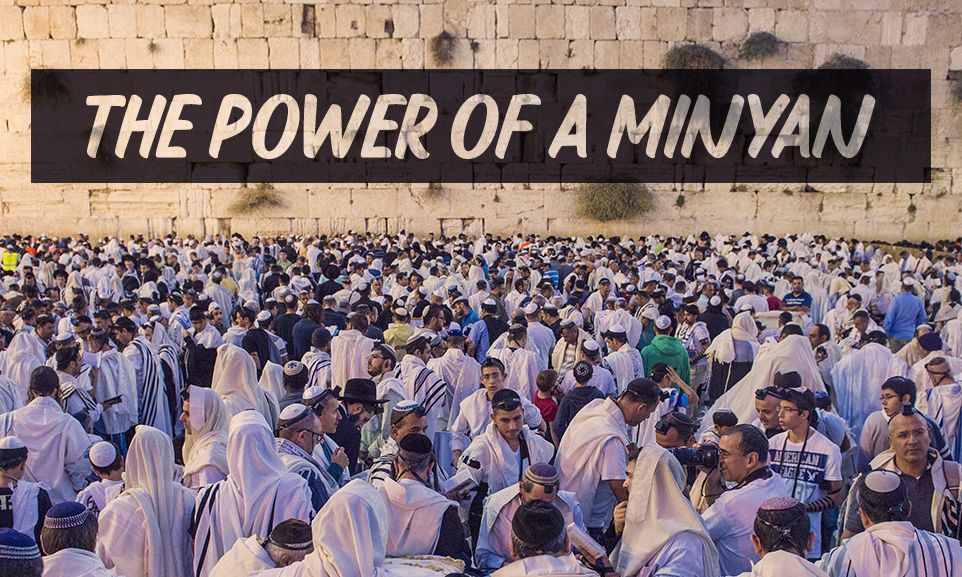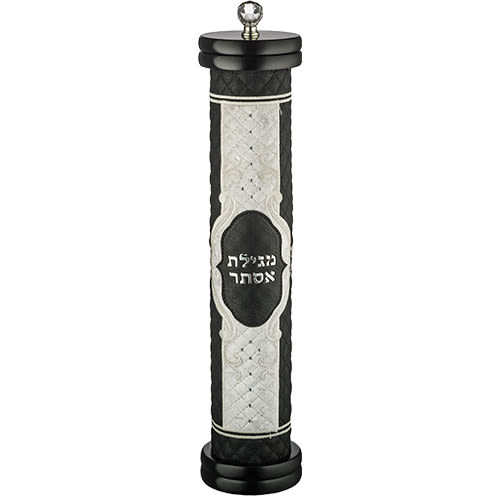
The Power of a Minyan
Are you someone who wants your prayers accepted? Do you want avoid heavenly accusations? Read the Kalever Rebbe's sure solution...

“And Yaakov was left alone, and a man wrestled with him until the break of dawn”. (Bereishit 32:25)
Stronger Together
The Baal Shem Tov, zt”l, and his students were once davening (praying) together in a minyan. When they reached the Shemoneh Esrei, each of the students slowly concluded their silent prayer and waited patiently for their Rebbe to finish so that the minyan could continue with the repetition.
However, the Baal Shem Tov remained immersed in his tefillot (prayers) for an extremely long time. Eventually, the students decided to leave and come back when the Baal Shem Tov would be finished and they could continue with the repetition.
When they returned, the Baal Shem Tov reprimanded them for leaving him without a minyan as he davened. He explained that he needed the power of tzibur, the congregation, for his tefillot to have their desired impact. He shared the following parable:
Everyone knows that birds fly to warmer climates in the winter. One time, the residents in one of these warmer climates saw a truly remarkable bird amongst the flock. The different shades of its feathers’ colors were astonishing and elegant. They had never seen a bird quite like this one. It was a marvel! The bird settled in and perched itself high up in a tree that was beyond the reach of anyone who wanted to try and capture it.
When the king heard about this magnificent bird perched high up in the tree, he ordered a group of his followers to stand on each other’s shoulders until the highest one of them could reach the bird and bring it back to the king.
As they were building this human tower, some of those on the bottom became restless and started moving around a little bit. As they started to disperse, the men that were further up plummeted to the ground and were injured. The entire group failed to capture the bird as the king had wished.
The Baal Shem Tov was able to access and draw down tremendous brachot, blessings, from the heavens through his tefillot. However, this only happened when he was connected to and joined by nine other Jews. When they left him alone, the entire tefillah fell apart. The brachot were unable to be captured.
This story teaches us the potency of davening with a minyan and demonstrates how much more powerful prayers are when they are said together with a tzibur, a congregation, compared to when someone davens alone. Even the tefillot of the holy Baal Shem Tov were unable to rise to the heavens and have their potential impact without a minyan.
Making the King’s Crown
Chazal taught (Brachot 8a): “From where do we know that the Holy One, Blessed be He, does not despise the prayer of the masses? As it is stated (Iyov 36:5), ‘Behold God is great and will not despise….'”
Davening with a minyan has such a potent power that those tefillot are never annulled; they are never “despised” or rejected.
In the Midrash (Eicha Rabba 3:8), Rav Acha explained this idea with a beautiful analogy: a group of people were called upon to contribute various materials for the creation of the king’s crown. There was an extremely impoverished individual among them who also contributed his share, albeit of lesser quality and value as the other gifts. When they presented the crown to the king, he did not reject the crown because of the poor man’s contribution. Rather, he immediately accepted it and placed the crown upon his head. So too, when ten tzaddikim stand together in prayer before Hashem, those prayers are accepted even if they are said by those who are not righteous individuals.
The Seforim HaKedoshim quote a similar analogy:
A king’s crown is adorned with various gems and precious stones, each one affixed by tiny holes and grooves. All around the crown there are elaborate etchings and other carvings. If these same scratches and holes were placed in a wall or on a painting, they would ruin its beauty. However, on a crown, they add to its grandeur and splendor.
So too, when someone prays alone, their tefillot are examined scrupulously. There are little holes and punctures that are created by their lack of focus during tefillah, by a lack of kavanah (concentration), or by something they may have done, etc. When someone davens with a minyan, however, his tefillot are not inspected for flaws and blemishes. Rather, his prayers are joined with everyone else’s, and they form a crown for Hashem. Those holes and groves become ornaments on the King of Kings’ crown.
Power of the Collective
The pasuk in Tehillim (102:18) says, “He has turned to the prayer of those who cried out, and He did not despise their prayer”. The Zohar (Bereishit 495a) explains that the pasuk uses the wording of “He has turned to” them rather than “hears” the tefillot because this is the very difference between davening alone or with a minyan. When someone davens alone, Hashem turns towards those prayers and examines if his heart is in the right place, if he has the proper intentions, and if he is truly a tzaddik whose prayers are worthy of being heard. However, when a congregation is davening together, Hashem does not “turn” to inspect the quality of those tefillot or those people; He does not examine their intentions or thoughts. Those tefillot are accepted immediately. Therefore, the pasuk concludes, “and He did not despise their prayer”. Even if there are those in the minyan who are unworthy of their prayers being accepted because of their wayward behavior, their tefillot are still accepted immediately and are not “despised.”
In his sefer the Divrei Yisroel, R’ Yisroel from Madzitz, zt”l quotes the teaching of Chazal that anything which is numbered does not become nullified, even by 1000. Something which is “counted” (minyan in Hebrew) is referring to davening with a minyan. Even if there are 1000 accusations trying to destroy those tefillot, the prayers will not be annulled. Hashem does not listen to the claims of the angels when it comes to prayer said with a congregation, a minyan.
The Mishmeres Isomar (end of Parshas Mishpatim ) recounts, that while he was going through a challenging time, he went to meet with the Chozeh from Lublin, zt”l. The Rebbe told him that the answer to all his problems was to be careful to always daven with a minyan and to never be lenient and daven alone. And, the Rebbe concluded with very sobering words, “When someone chooses to daven alone when they could have done so with a minyan, this leads to a heavenly accusation against that person, chas v’shalom.”
Yaakov’s Battle
This is alluded to in the story of Yaakov’s battle with the Satan. The Torah tells us, “And Yaakov was left alone” – When a person is davening alone, “the Satan battles him” to try and nullify his prayers through heavenly accusations.
However, when someone davens with a minyan, those tefillot instantly are accepted.
***
The Kalever Rebbe is the seventh Rebbe of the Kaalov Chasidic dynasty, begun by his ancestor who was born to his previously childless parents after receiving a blessing from the Baal Shem Tov zy”a, and later learned under the Maggid of Mezeritch zt”l. The Rebbe has been involved in outreach for more than 30 years, and writes weekly emails on understanding current issues through the Torah. You can sign up at www.kaalov.org.










Tell us what you think!
Thank you for your comment!
It will be published after approval by the Editor.